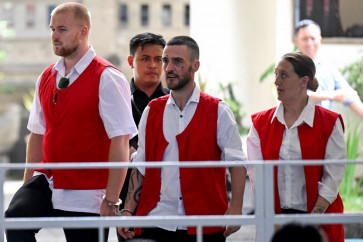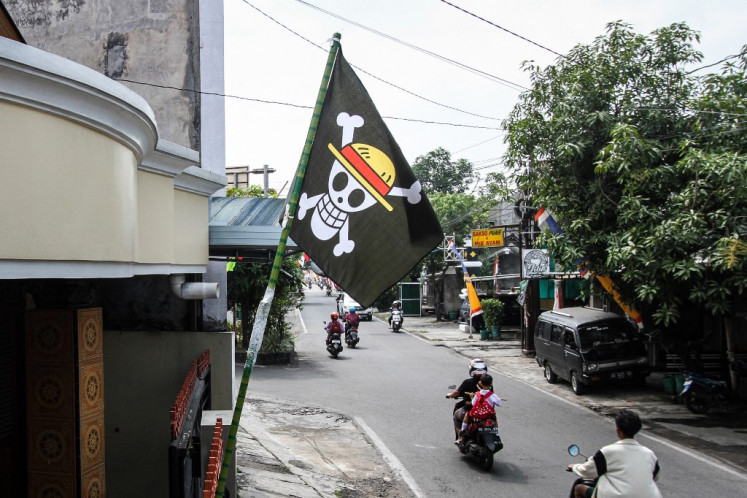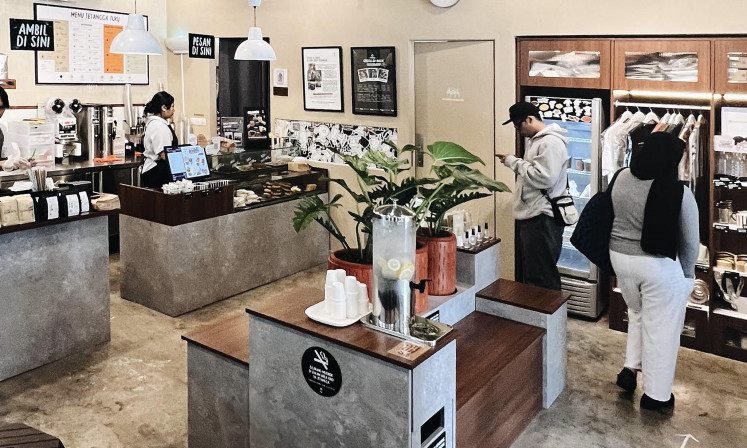Popular Reads
Top Results
Can't find what you're looking for?
View all search resultsPopular Reads
Top Results
Can't find what you're looking for?
View all search resultsHM Maryono: Pursuing Indonesian brands of herbal medicine
JP/Simon Sudarman Making a globally recognized Indonesian herbal medicine brand has been a dream long pursued by HM Maryono, a recipient of various national awards relating to medicinal herb cultivation
Change text size
Gift Premium Articles
to Anyone
J
span class="caption" style="width: 339px;">JP/Simon Sudarman Making a globally recognized Indonesian herbal medicine brand has been a dream long pursued by HM Maryono, a recipient of various national awards relating to medicinal herb cultivation.
The winner of two Kalpataru and Kehati environment awards has managed, in collaboration with 150 spice farmers on the slopes of the Menoreh Kokap hills in Kulonprogo, Yogyakarta, over 10 hectares of farmland since 2007.
“We coordinate with farmers regarding what spices to grow and we buy the spices as materials for the preparation of herbal medicine,” said Maryono director of Salama Nusantara, a herbal medicine factory set up in 2004 in Sebokarang, Wates, Kulonprogo Yogyakarta.
In his view, the time has come to champion products that bear local characteristics upon the international stage. To achieve this, Maryono resigned from his job as a civil servant in 2007.
“I want to teach the younger generation that rather than becoming a civil servant, entrepreneurialism is a much better opinion. Today, Indonesian businesspeople make up less than 1 percent of the population. I wish to see the number reach 4 percent so the country will prosper,” said the 2009 postgraduate alumnus of Gajah Mada University (UGM), Yogyakarta.
The 49-year-old was inspired to establish his herbal drug business because of the abundance of herbal resources in Indonesia — there are over 2,000 medicinal plant species in Indonesia that are yet to be fully exploited.
“In fact, herbal medicines, when used properly, have no side effects. So we should return to nature as a lifestyle choice,” said the UGM and Yogyakarta State University herbal medicine guest lecturer.
The vision of local Indonesian herbal brands known throughout the world has home grown support, evidenced by the opening of the herbal medicine diploma program in 2006 at UGM.
“I hope the government will set up universities specializing in the research and development of herbal medicine in cooperation with herbal companies. This way, we won’t export herbal materials only to repurchase herbal medicine — as we’ve done so far. We will export [the final product] instead,” Maryono, the winner of the 2012 Paramakarya Award presented by Manpower and Transmigration Minister Muhaimin Iskandar, said.
Maryono said that Indonesia’s herbal medicines were no less effective than those produced by China, which currently dominates the country’s herbal drug market. Indonesian products are considered inferior because they lack branding.
“China promotes brands intensively; as such the Chinese herbal medicines seem spectacular. It must, however, be taken into account that China has approached the business of drug management much earlier [than us] and thus, its professionalism is more developed than our own. This is our challenge. If we manage our herbal business properly; from processing to marketing, I’m sure we’ll be competitive,” said Maryono, whose company has exported its products to Malaysia and Suriname, South America.
To date, Maryono’s herbal medicine have been distributed to all parts of Indonesia with Batam, Riau, used as a stepping stone for exports. He admitted it was a strenuous task to expand the domestic market as consumers had to be made aware of the processes involved with herbal treatment. As such, the venture
required patience and perseverance.
“Sadly, this aspect is less understood by society. People want to be cured immediately. Actually, medicines with direct effects are definitely chemical based rather than herbal preparations. So the public should follow a nature-oriented lifestyle and consumption pattern to avoid diseases,” noted Maryono, who frequently speaks at workshops and seminars in various cities and colleges.
With 30 employees and 150 casual workers, Maryono develops and prepares medicines without preservatives or chemical additives, through a wholly organic and pesticide-free manufacturing process.
Learning to combine herbal ingredients from his parents, who used to sell traditional medicine, Maryono has also read relevant books, consulted herbal medicine experts and conducted research to guarantee the most effective dose and composition.
Maryono believes that the struggle to promote national brands will be difficult without government support. He would like the government to be active in this respect, such as putting in place regulations set by the Health minister obliging physicians to include herbal medicine in their prescriptions.
With regards to the promotion of healthy living through herbal medication Maryono hopes herbal therapy will be a subject taught to students throughout primary school and senior high school.
The husband of Nur Hidayati Ma’rifah, father of two and grandfather to two also plans to establish a holistic hospital offering only herbal and traditional therapy in 2016 in Kulonprogo, to coincide with the opening of the Kulonprogo International Airport.
“As long as we maintain a nature-friendly attitude, our lives will enjoy material and spiritual wellbeing,” said Maryono, adding that his company’s name, Salama Nusantara, means rescuing Indonesia.










